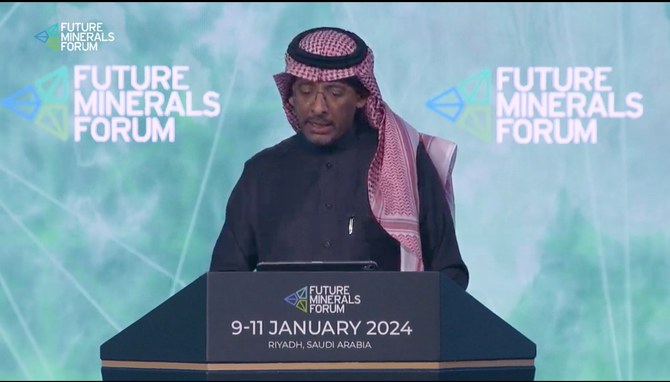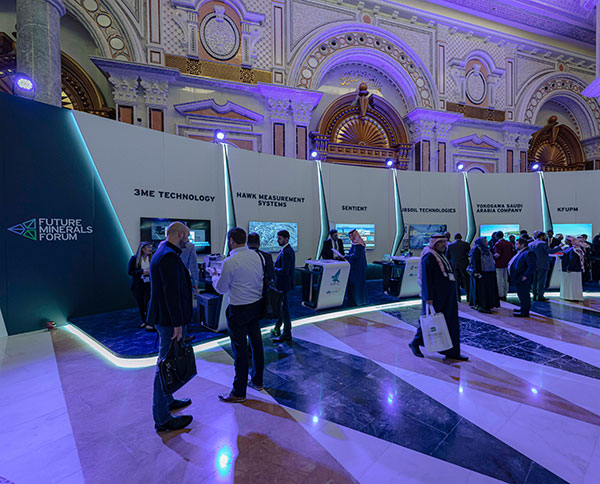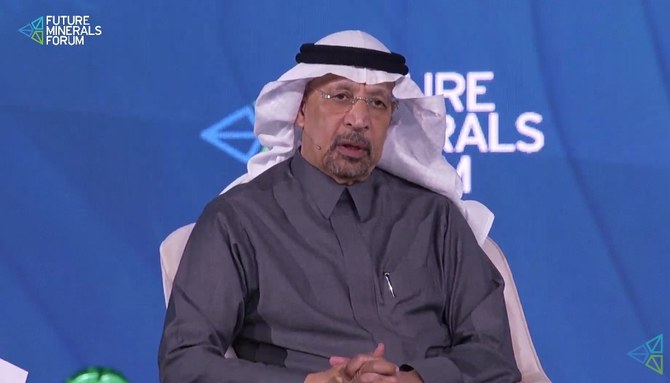Saudi Arabia’s mining strategy is taking another leap, not only due to increased financing and potential international interest, but based on the outcome of its latest review of its overall untapped mineral resources. At the Future Minerals Forum 2024 (FMF2024) in Riyadh, Saudi minister of mining and mineral resources Bandar Al Khorayef, after presenting a cliffhanger already at the yesterday’s mining ministers session, stated that the Kingdom has revised upwards estimates for its untapped mineral resources including phosphate, gold and rare earths to $2.5 trillion, an almost 90% increase of former estimates of $1.3-trillion in 2016. Since the presentation of Saudi Vision 2030 economic diversification strategy by Crown Prince Mohammed bin Salman in 2016, the Kingdom has put an increased effort to develop and monetize its domestic minerals and metals reserves.

A major leading factor of this mining strategy is the need to counter increased Saudi construction and renewable energy materials and products, as the Oil King is weaning itself from its hydrocarbon revenue addiction. Al Khorayef stated “this increase of $1.2-trillion is a combination of more of what we have, like phosphate, and new, like rare earths, and revaluation of (commodities) pricing”. The minister also indicated that 10% of the increase in estimate comes from the addition of rare earths minerals, important for electric vehicles and high-tech products. In 2024, Saudi Arabia expects to award over 30 mining exploration licenses to international investors and operators. To support the latter, Saudi Arabia is also setting up new regulations, which will allow to offer larger exploration areas of more than 2 000 km for each license. The latter is a major boost, as international operators and investors are more eager to take part if the licenses are entailing larger areas. Since 2022 Saudi Arabia has been awarding licenses to international miners.

At the same time, the Kingdom is in dire need to set up a full supply chain to reap the real rewards of the current interest in mining. To gain a higher margin, the Kingdom will need to invest more in processing and manufacturing capacity the coming years. The last two years already major deals have been made with Chinese and other investors to set up major steel plants in the Kingdom. However, the manufacturing of products out of the metals and minerals produced is still at a reasonably low level. Looking at major plans to expand or build new ports and shipyards, as presented under the new set up Saudi maritime giant SOFON, the Kingdom wants to become a major regional and global manufacturing giant, able to produce for local markets and export products, such as renewable energy construction materials, or even potentially offshore wind sector products.
For the domestic market, Saudi Arabia has set up a mineral exploration incentive program, holding a budget of over $182 million. The latter will be needed also, as Al Khorayef indicated, to support the potential drive to increase the overall metals and minerals reserves, as the current upgrade to $2.5 billion is not the overall potential. The minister indicated that there is much more available, as current assessments only are on 30% of the Arabian shields exploration. Saudi sources expect that the FMF 2024 will witness deals valued of around $20 billion. El Khorayef, when referring to the incentive program, stated that “this program will de-risk investments in our exploration securing to enable new commodities, greenfield projects, and junior miners”.
At the same time, Riyadh is having its eyes on international mining opportunities, with a specific focus on access to minerals and metals in African countries. Al Khorayef stated already that he wants the Kingdom to become a processing hub for different minerals currently being mined in Africa. Part of this internationalization is already in place, as whon by the set-up of an investment fund Manara Minerals, which is a joint venture between Saudi sovereign wealth fund PIF and Saudi mining giant Ma’aden. The JV already has taken 10% equity in Vale’s $26-billion copper and nickel unit July 2023. It is expected that Saudi and other Arab SWFs will increasingly be on the take-over or M&A path internationally, as commodities are playing a crucial or even pivotal role in all.

During the FMF2024 Egypt and Saudi Arabia have already signed a memorandum of understanding (MOU) to expand and support bilateral cooperation in mineral resources. The MoU was signed by the Egyptian Minister of Petroleum Tarek El-Molla and Al Khorayef. The main important part of the MOU is clear, as it will enable the private sector in the two countries to invest in the mining sector.
The need for increased minerals and metals production is clear, according to Yasir Al Rumayyan, the governor of the PIF, as global demand for metals will see a sixfold increase by 2040. Al Rumayyan also stated that “for us at the PIF, we think that mining is really a big opportunity for all the investment community, I think if we want to move toward net-zero carbon emissions, the demand (for minerals) there will be even bigger.” Former Saudi minister of oil Khalid Al Falih, now minister of investment, stated also that the Kingdom and the Middle East will need to increase overall cooperation with Africa and Central Asia. As Al Falih said, collaboration between countries in Central Asia, Middle East and Africa is needed to harness critical minerals which is crucial to ensure a smooth energy transition. “The super region from Central Asia, all the way to the Middle East to Africa is already known to have at least a third of global resources. The demand for materials (critical minerals) is going to be a multiple of what it is today”, the investment official stated. Al Falih also reiterated that supply and international trade will be crucial, as the future of energy transition and diversification will be depending on resolving supply chain issues, also in the mineral industry. He also noted that trillions of dollars are needed in the next couple of decades to meet the “reshaping of the global supply chain” in the industry. As stated in Vision 2030, the Kingdom wants to play a major role in the all, while additionally using its geographical position.
All this optimism is however currently under pressure, not due to fledgling demand, or lack of investments, but geopolitics or hard-core kinetics are at play. The current Red Sea – Houthi conflict, Gaza and Hezbollah or potentially a confrontation with Iran, is on the mind of all.
